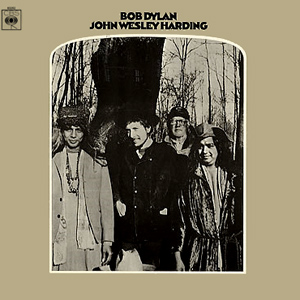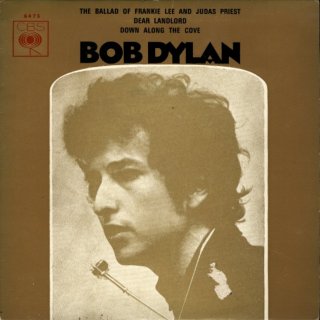Related Research Articles

"All Along the Watchtower" is a song by American singer-songwriter Bob Dylan from his eighth studio album, John Wesley Harding (1967). The song was written by Dylan and produced by Bob Johnston. The song's lyrics, which in its original version contain twelve lines, feature a conversation between a joker and a thief. The song has been subject to various interpretations; some reviewers have noted that it echoes lines in the Book of Isaiah, Chapter 21, verses 5–9. Dylan has released several different live performances, and versions of the song are included on some of his subsequent greatest hits compilations.

John Wesley Harding is the eighth studio album by the American singer-songwriter Bob Dylan, released on December 27, 1967, by Columbia Records. Produced by Bob Johnston, the album marked Dylan's return to semi-acoustic instrumentation and folk-influenced songwriting after three albums of lyrically abstract, blues-indebted rock music. John Wesley Harding was recorded around the same time as the home recording sessions with The Band known as The Basement Tapes.

World Gone Wrong is the twenty-ninth studio album by American singer-songwriter Bob Dylan, released on October 26, 1993, by Columbia Records.
"Talkin' World War III Blues" is a song written and performed by the American singer-songwriter Bob Dylan that was first released as the tenth track of his 1963 album The Freewheelin' Bob Dylan. Like nearly every song on the album, it is performed by Dylan solo, accompanying himself on acoustic guitar and harmonica played in a rack.
"As I Went Out One Morning" is a song written and performed by American singer-songwriter Bob Dylan, released as the second song on his 1967 album John Wesley Harding.

"The Ballad of Frankie Lee and Judas Priest" is a song by American singer-songwriter Bob Dylan. It was released as the fifth track on his eighth studio album John Wesley Harding (1967). The track was written by Dylan and produced by Bob Johnston. It was recorded in one take on October 17, 1967, at Columbia Studio A in Nashville. The song's lyrics refer to two friends, Frankie Lee and Judas Priest. Lee asks Priest for a loan of money and Priest offers it freely. Lee spends it in a brothel over 16 days, then dies of thirst in Priest's arms. It has been suggested by commentators that the song refers to Dylan's relationship with his manager Albert Grossman or to his contractual negotiations with his record company. The song received a mixed critical reception. Dylan performed the song live in concert 20 times, from 1987 to 2000.
"Tombstone Blues" is a song by American singer-songwriter Bob Dylan, which was released as the second track on his sixth studio album Highway 61 Revisited (1965). The song was written by Dylan, and produced by Bob Johnston. Critical interpretations of the song have suggested that the song references the Vietnam War and US President Lyndon Baines Johnson.

"Love Sick" is a minor-key love song by American musician and Nobel laureate Bob Dylan. It was recorded in January 1997 and appears as the opening track on his 30th studio album Time Out of Mind (1997). It was released as the second single from the album in June 1998 in multiple CD versions, some of which featured Dylan's live performance of the song at the 1998 Grammy Awards. The song was produced by Daniel Lanois.
"Sugar Baby" is a song written and performed by the American singer-songwriter Bob Dylan, released in 2001 as the 12th and final track on his album Love and Theft. Like most of Dylan's 21st century output, he produced the song himself under the pseudonym Jack Frost.
"Mississippi" is a medium-tempo country-rock song by the American singer-songwriter Bob Dylan that appears as the second track on his 2001 album Love and Theft. The song was originally recorded during the Time Out of Mind sessions, but was ultimately left off the album. Dylan rerecorded the song for Love and Theft in May 2001.
"Workingman's Blues #2" is a song written and performed by American singer-songwriter Bob Dylan, released as the sixth track on his 2006 album Modern Times. As with much of Dylan's 21st-century output, he produced the song himself under the pseudonym Jack Frost.
"Simple Twist of Fate", a song by American singer-songwriter Bob Dylan, was recorded on September 19, 1974, and was released in 1975 as the second song on his 15th studio album Blood on the Tracks.
"Summer Days" is an uptempo twelve-bar blues/rockabilly song written and performed by American singer-songwriter Bob Dylan that appears as the third song on his 2001 album Love and Theft. It was anthologized on the compilation album The Best of Bob Dylan in 2005. Like most of Dylan's 21st century output, he produced the song himself under the pseudonym Jack Frost.
"Narrow Way" is a blues rock song written and performed by American singer-songwriter Bob Dylan that appears as the third track on his 2012 studio album Tempest. Like much of Dylan's 21st-century output, he produced the song using the pseudonym Jack Frost.
"Long and Wasted Years" is a song written and performed by Bob Dylan that appears as the fourth track on his 2012 studio album Tempest and was anthologized on the 2016 reissue of The Essential Bob Dylan. Like much of Dylan's 21st-century output, he produced the song himself using the pseudonym Jack Frost.
"Scarlet Town" is a folk song written and performed by Bob Dylan that appears as the sixth track on his 2012 studio album Tempest. Like much of Dylan's 21st-century output, he produced the song himself using the pseudonym Jack Frost.
"Roll On John" is a song written and performed by American singer-songwriter Bob Dylan that appears as the tenth and final track on his 2012 studio album Tempest. Like much of Dylan's 21st-century output, he produced the song himself using the pseudonym Jack Frost.
"Lonesome Day Blues" is a twelve-bar blues song written and performed by Bob Dylan that appears as the fifth song on his 2001 album Love and Theft. Like most of Dylan's 21st century output, he produced the song himself under the pseudonym Jack Frost.
"I Pity the Poor Immigrant" is a song by American singer-songwriter Bob Dylan. It was recorded on November 6, 1967, at Columbia Recording Studios in Nashville, Tennessee, produced by Bob Johnston. The song was released on Dylan's eighth studio album John Wesley Harding on December 27, 1967.
"Dear Landlord" is a song by American singer-songwriter Bob Dylan. It was recorded on November 29, 1967, at Columbia Recording Studios, Nashville, produced by Bob Johnston. The song was released on Dylan's album John Wesley Harding on December 27, 1967. It is a piano blues that has been interpreted as an address to his then-manager Albert Grossman.
References
- ↑ Kosser, Michael (2006). How Nashville Became Music City, U.S.A.: A History Of Music Row. Lanham, Maryland, US: Backbeat Books. pp. 149–150. ISBN 978-1-49306-512-7.
- ↑ Margotin, Philippe; Jean-Michel Guesdon (2015). Bob Dylan : all the songs : the story behind every track (First ed.). New York. ISBN 978-1-57912-985-9. OCLC 869908038.
{{cite book}}: CS1 maint: location missing publisher (link) - ↑ "Ain't Goin' Nowhere". www.bjorner.com. Retrieved 2021-05-29.
- ↑ Mills, Gordon (1968-02-24). "John Wesley Harding". Rolling Stone. Retrieved 2021-05-29.
- ↑ "I am a Lonesome Hobo: the meaning of the music and the lyrics | Untold Dylan". 2015-01-31. Retrieved 2021-05-29.
- ↑ "I Am A Lonesome Hobo. Dylan leaves the tap running. | Untold Dylan". 5 March 2020. Retrieved 2021-05-29.
- ↑ Marcus, Greil (2021). "Chapter 6: The Blues". In Latham, Sean (ed.). The World of Bob Dylan. Cambridge, United Kingdom: Cambridge University Press. p. 74. ISBN 978-1-108-49951-4.
- ↑ "Tracks on Dylan - Totta & Wiehe (2006) | SecondHandSongs". secondhandsongs.com. Retrieved 2021-05-29.